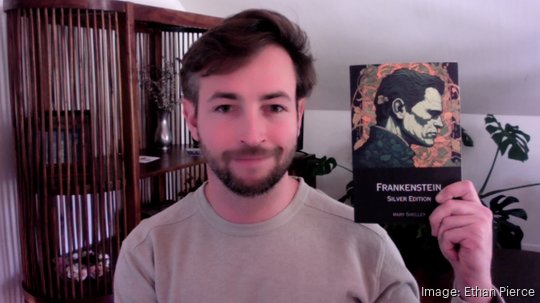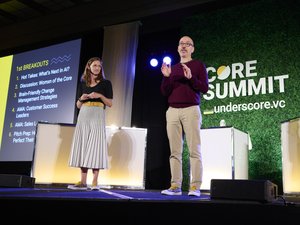
A new Cambridge startup wants to make literary classics like “Frankenstein,” “Pride and Prejudice” and “Wuthering Heights” available for all reading levels and in multiple languages.
The company behind this idea, Adaptive Reader, plans to do this with its own AI-assisted platform, which co-founder Ethan Pierce says can rewrite full books at different reading levels and in multiple languages.
“I started wondering as the machine-learning models like ChatGPT became so widely available over the past year whether or not there was an opportunity to sort of invert this traditional model,” Pierce said.
Rather than supporting a student with reading text at the grade level they’re supposed to be at, Pierce wants to create text suited to the reading level of each student.
“It was able to produce a copy of ‘Frankenstein’ rewritten to a sixth-grade level. I started showing that to teachers and administrators and they were so excited by this concept that we started looking at how we could scale that technology,” Pierce said.
Becoming an edtech founder
This is Pierce’s third venture. He co-founded his last startup, Grocery Outpost, in April 2020 with Emma Snyder after they both found themselves unemployed. Pierce had been a consultant with Techstars Boston teams that no longer had the runway to hire him and Snyder had been laid off from Toast. Grocery Outpost operated for about seven months enabling restaurants to sell groceries locally.
The startup grew to work with 12 restaurants and over 800 households in Greater Boston. But Pierce said Grocery Outpost ultimately became just a pandemic venture as they realized there were several opportunities for error in their approach, including relying on the restaurant supply chain and restaurants themselves to fulfill orders.
Pierce has also worked as chief product officer at Readlee, which was acquired by Paper. The company’s speech-integrated system listened to students reading text out loud and provided personalized feedback.
Pierce knows from personal experience the value of literacy.
“I think the thing that keeps dragging me back to the literacy space is my own story. I hadn’t learned to read at the end of third grade. I was put into special education classes. And then fast forward eight years, I received a full scholarship to Harvard,” Pierce said.
His story could have easily turned out differently if he didn’t have teachers that gave him individual attention in his reading journey, Pierce said, but not everyone has that support.
To him, Adaptive Reader represents an opportunity to personalize the reading experience.
Finding early traction
Pierce began working on this new venture full time in July. Adaptive Reader now has 50 different classic novels at three different reading levels available in print. They’re also making a web application for this fall to allow students and teachers to access hundreds of different texts at different reading levels and with bilingual translations.
Pierce co-founded the startup with Eric Carlstrom. The team is raising a pre-seed round.
Adaptive Reader is also developing its own proprietary technology to produce classroom-ready versions of stories. Pierce said ChatGPT is a good start, but it doesn’t necessarily produce a consistent and accurate rewrite of the original story. And, it doesn’t always create the correct reading level for materials.
The startup is starting out with book orders from individual teachers. Pierce said they’re working on school partnerships for its web application. The application will have free content as well as premium content.
Pierce said they’ve had some resistance from people who were concerned they’re changing the text of important books.
“Yes, the words are important and they’re beautiful. But I think the reason that these books have stuck around for so long is because the stories in them raise these really important questions that we’re still grappling with about class and society and how to be a better person,” Pierce said. “Making those stories available and allowing every student in class to be able to grapple with those questions is something meaningful and powerful.”
Sign up for The Beat, BostInno’s free daily innovation newsletter from BostInno reporter Hannah Green. See past examples here.








